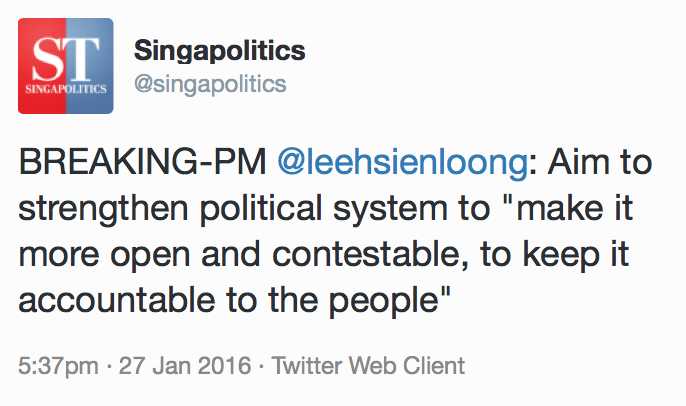COMMENT: There are better reforms than extending the NCMP scheme

(Yahoo file photo)
A new parliamentary session has begun and constitutional changes are on the cards. At first, there were whispers that the elected presidency would be abolished, bringing Singapore back to a system where the president was elected by Parliament.
Prime Minister Lee Hsien Loong’s speech reassured all Singaporeans that this would not be the case. The elected presidency would be adjusted (details akan datang), but not abolished.
Lee also signalled his intention to give all Non-Constituency Members of Parliament (NCMPs) full voting powers, and to increase the number of NCMPs from nine to 12. This would guarantee a dozen opposition voices in Parliament regardless of election results.
The concept of the NCMP was introduced in 1984, when then-Prime Minister Lee Kuan Yew felt that having three such seats would allow young Singaporeans – who, up to that point, were living with a PAP-only Parliament – to learn about constitutional opposition by seeing opposition members in the house. The plan was criticised by opposition parties then, who saw it as a ploy to trick Singaporeans into not voting in opposition candidates on their own steam. Following the wins of Chiam See Tong and J B Jeyaretnam in the general election that year, the one NCMP seat was left vacant as both MPD Nair of the Workers’ Party and Tan Chee Kien of the Singapore United Front refused to take up the position.
The decision of Workers’ Party candidate Lee Li Lian’s decision not to take up her NCMP seat following the results of the 2015 general election has been commented upon a few times by the ruling People’s Action Party so far. The Leader of the House, Grace Fu, said that her decision “should not be taken lightly”, evoking the people of Punggol East who had voted for her and might be disappointed with her decision. The prime minister mentioned it on Wednesday too, saying that, apart from 1984, opposition candidates have always taken up the NCMP seat offered them.
The attraction of the NCMP seat to opposition parties in Singapore isn’t hard to understand. In a climate where opposition candidates face an uphill battle in getting elected, the NCMP seat is better than nothing. It gives the candidate experience in parliamentary procedure and ensures more exposure to the public, building a profile and track record that will be advantageous in the next election. NCMPs have also done marvellous jobs, sometimes asking questions that even the elected opposition MPs have failed to ask. (See: Mrs Lina Chiam in Parliament from 2011 to 2015.)
But the NCMP scheme is a farce, and participating in it – no matter the practical benefit for the candidate and party – validates and perpetuates a system in which the skew in party representation is accepted as a feature of local politics. With an overwhelming majority in Parliament, the ruling party has the ability to pass constitutional amendments to determine the number of NCMP seats as and when it suits them. The fact that they have so far only increased the number of NCMP seats should not make us forget that they also have the power to reduce the number should they want to do so.
During the 2015 general election, I’ve also heard PAP candidates assure the electorate that there is no need to worry about voting in the opposition, as there would be nine non-PAP NCMPs no matter what to ask questions and provide the “check” that people are concerned about – thus justifying the criticism that opposition parties had raised over 30 years ago.

If the government were really interested in strengthening the political system to “make it more open and contestable, to keep it accountable to the people” there are many reforms that can be done.
We could stop gerrymandering and changing the electoral boundaries shortly before the campaigning period. The election date could be fixed, rather than according to when it would best suit the incumbent. We could free the mainstream media so that they can be more free to report on all political parties and actually play a role as a Fourth Estate watching those in power and keeping them accountable. We could stop using the People’s Association as an extended outreach and campaigning arm of the PAP. We could abolish the Group Representation Constituency system, which allows the ruling party and its anchor ministers to win a disproportionate number of seats as compared to the popular vote.
There is no shortage of reforms that could be carried out to level the playing field and allow the opposition a fair chance to vie for votes.
Singaporeans do not need the ruling party to “grant” us opposition voices. We should have the right to vote them in ourselves, properly, in elections that are both free and fair.
Lee Li Lian was absolutely right to reject the NCMP seat. The only pity is that she was the only one; opposition parties should stop validating this condescending insult to democracy.
Kirsten Han is a Singaporean blogger and journalist. She is also involved in the We Believe in Second Chances campaign for the abolishment of the death penalty. A social media junkie, she tweets at @kixes. The views expressed are her own.


